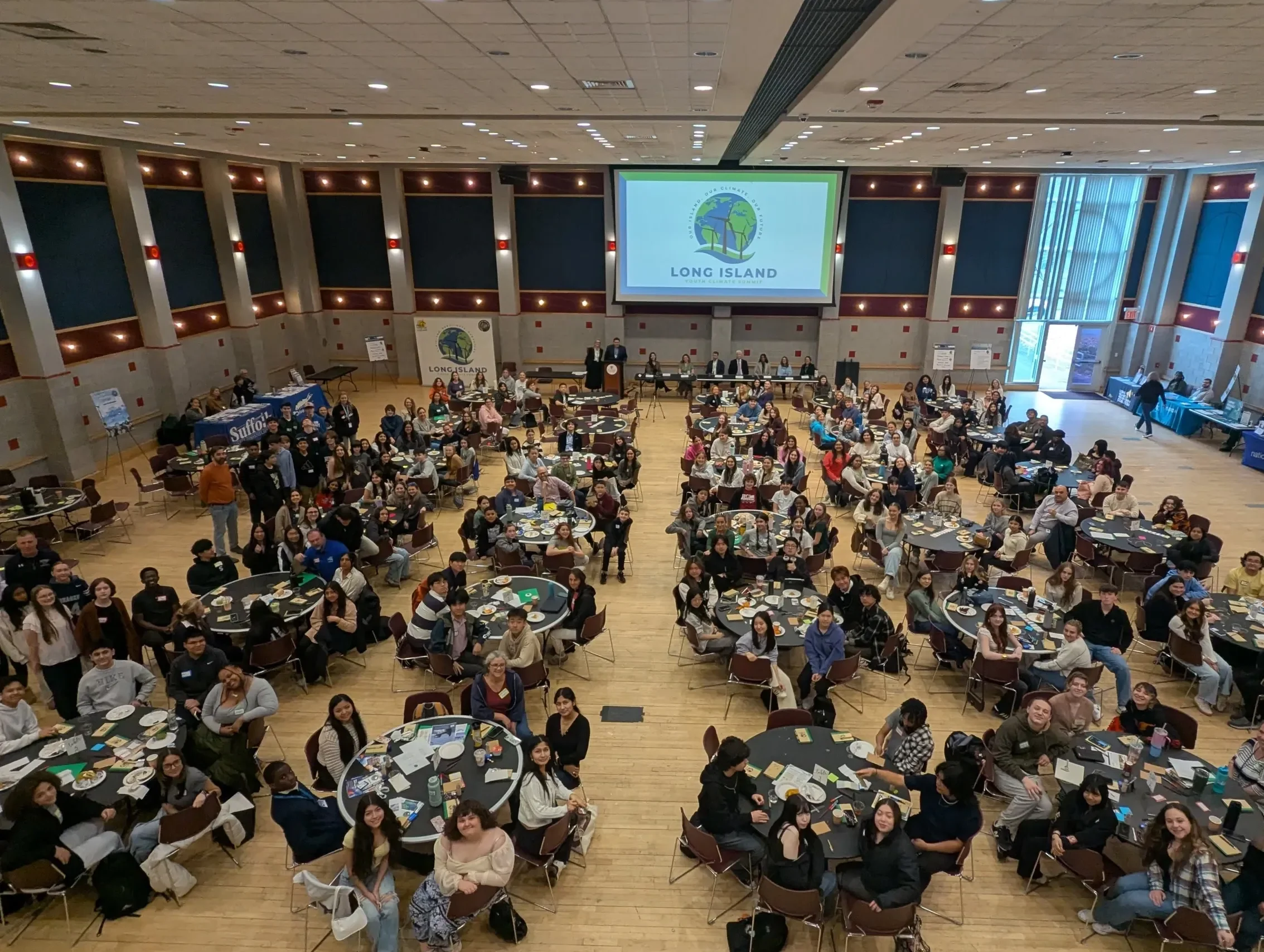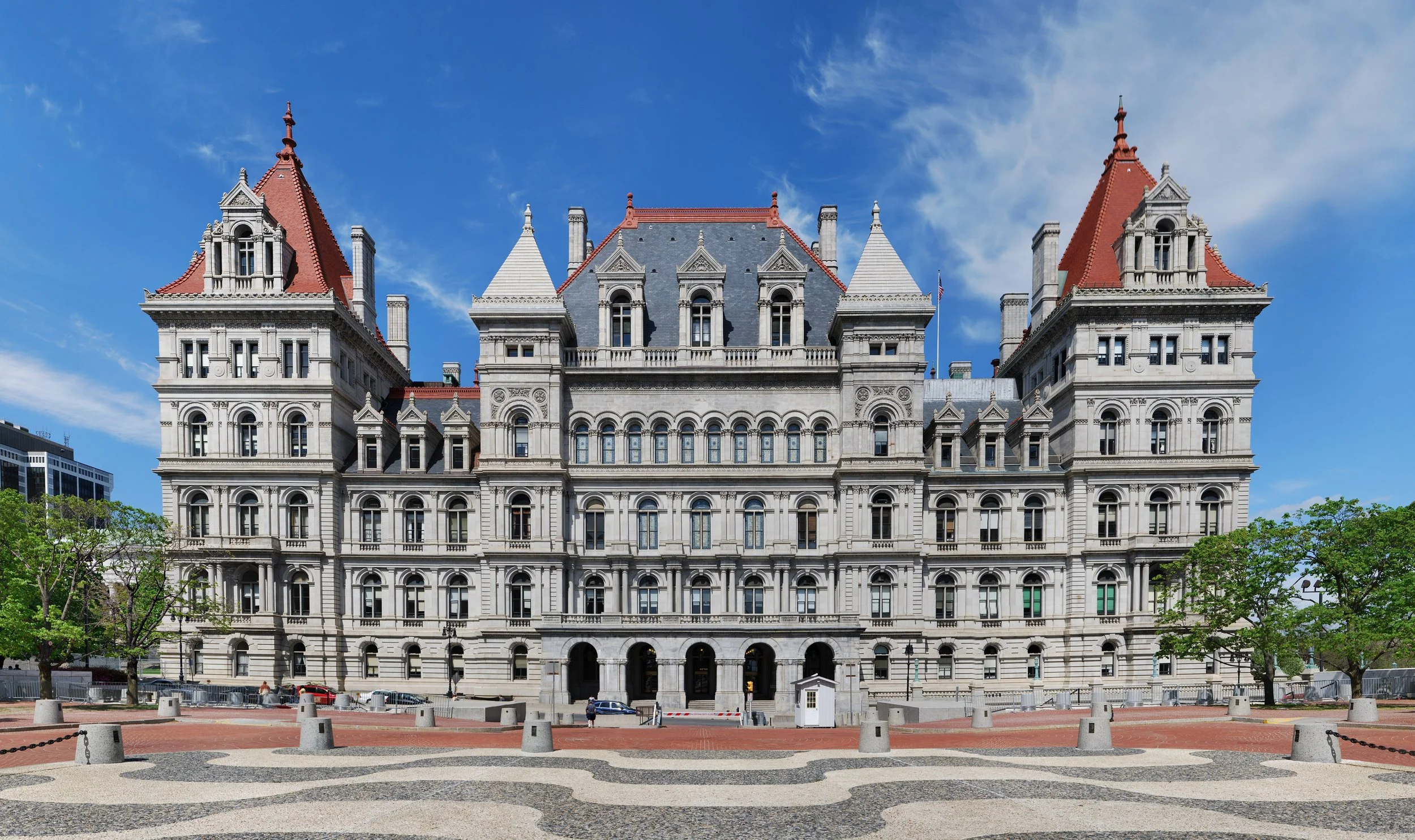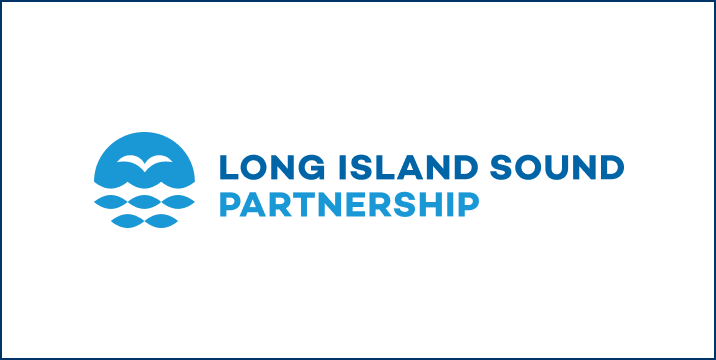For Immediate Release: February 7, 2023
New legislation will reduce plastic and paper waste, increase recycling, encourage use of recyclable materials—and save local governments money
Albany, NY – A number of important environmental and governmental advocates joined New York State Senator Pete Harckham today for an announcement of his new legislation, the Packaging Reduction and Recycling Infrastructure Act. The legislation will revolutionize New York’s approach to solid waste and focus responsibility on the corporations that put packaging into the stream of commerce and help to relieve the burden placed on local governments, taxpayers and consumers for the management & disposal of most of New York’s solid waste.
The new bill (S.4246) will require companies with a net annual income of over $1 million to reduce consumer packaging, improve recycling efforts of their product packaging and help update recycling infrastructure. Additionally, companies will be expected to create and / or maintain reusable and refill infrastructure, support municipal recycling programs financially and reduce the toxins in their packaging.
“We need to immediately address one of the dire problems of our age: the tremendous amount of waste, much of it recyclable, that we create each day—and that costs taxpayers and municipalities hundreds of millions of dollars in wasted carting and recycling costs,” said Harckham, chair of the Senate Environmental Conservation Committee. “The only way we can begin to mitigate the growing issue of waste pollution, which threatens our natural resources, is for the initial producers of this waste to be fully involved with the end-of-life solutions. Right now, municipalities and taxpayers are footing practically all of the enormous costs of product packaging pollution and recycling, and that’s neither fair nor viable in the long run.”
To view a video of the announcement, click here.
The average New Yorker creates nearly 5 pounds of trash every day, which means our state produces approximately 15 million tons of waste each year. This waste primarily goes to landfills and incinerators, and often ends up in our water, natural habitats, and public spaces.
The recycling rate for the entire United States was estimated to be between 5-6% in 2021. While New Yorkers understand the importance of reducing their waste, reusing what we can and recycling, our current system is not meeting our environmental demands. Local governments continue to struggle with recycling costs and infrastructure, evidenced through increased taxes or significantly limited materials that can be collected.
Harckham’s bill will require eligible producers of consumer packaging and recyclable waste to join a Producer’s Responsibility Organization (PRO) within a year of the bill’s enactment and create a plan within 18 months for submission to an advisory council to gauge compliance with the new packaging and recycling rules. Once approved, producers have six months to put their plan into action.
The bill’s timeline calls for producers to reduce their packaging by 10% of weight within three years, 20% by five years, 30% by eight years, 40% by 10 years and 50% by 12 years.
Moreover, there will be specific standards for post-consumer recycled material for packaging. Glass should be at least 35% post-consumer recycled content, paper carry out bags should be 40% and plastic bags should be 20%.
However, Harckham’s bill explicitly does not cover, among other things, newspapers and magazines, medical products and devices, and beverage containers subject to the returnable deposit under current law.
The New York State Department of Environmental Conservation (DEC) will determine the effectiveness of each producer’s education and outreach efforts regarding their packaging plan. If a plan is not approved within two years, the producer may be subject to penalties for noncompliance.
To this end, the bill will establish an Office of the Inspector General under DEC to gauge compliance. Producers in violation will be fined $100,000 a day until requirements have been implemented. The PRO will be required to submit an annual report on their packaging and recycling.
A fee system will be instituted and approved by the DEC for the PRO to calculate costs to provide curbside collection, process materials for recycling and to deal with packaging that cannot be processed or recycled.
Unlike the proposal in the Executive Budget, Harckham’s bill also focuses on eliminating toxic chemicals and compounds in packaging material. This bill, once enacted, will give producers two years to remove certain toxic substances—PFAs, heavy metals, formaldehyde, halogenated flame retardants and more—from their packaging. Three years after the bill’s enactment, DEC must add another 10 or more substances to this list of proscribed toxic chemicals.
Adrienne Esposito, Executive Director of Citizens Campaign for the Environment (CCE), said: “It’s time for corporations to take out their own trash. Each year companies ship billions of packages, exacerbating the solid waste crisis, yet bear no responsibility for managing the waste they create. Municipalities and taxpayers should not have to shoulder the financial burden of paying for corporations’ excessive and unrecyclable packing, we need to hold corporations responsible. CCE applauds Senator Harckham for taking the lead in addressing New York’s solid waste and recycling crisis by introducing the Packaging Reduction and Recycling Infrastructure Act.”
Bobbi Wilding, Executive Director of Clean+Healthy New York, said: “We are grateful to Senator Harckham for introducing a bill that addresses our waste problem through provisions that drive reuse infrastructure, restrict toxic chemicals, and ensure 'recycling' technologies don't serve as a proxy for burning fossil fuels with plastic as a pass-through. Making this bill law will move New York in the direction of a circular economy that protects our health and the environment.”
Caitlin Ferrante, Conservation Program Manager, Sierra Club Atlantic Chapter, said: “Addressing the full lifecycle of packaging and paper products is an essential piece of the circular economy we want to achieve here in New York. We are grateful to Senator Harckham for introducing this comprehensive legislation and look forward to working with him and the legislature to get this bill passed this year.”
Eric A. Goldstein, New York City Environment Director at the Natural Resources Defense Council, said: “This sensible and visionary legislation promises to save money for municipalities and taxpayers, remove toxic substances from packaging and incentivize producers to cut waste. Senator Peter Harckham has found just the right formula for a 21st century waste reform bill—centering waste prevention and reuse, discouraging climate-destroying single-use plastics and protecting public health. Bravo to Senator Harckham for his leadership in advancing this sound proposal.”
Julie Tighe, President of the New York League of Conservation Voters, said: “To achieve our goal of zero waste, New York State must adopt policies to create a circular economy that prioritizes recycled and recyclable materials and incentivizes using less packaging in the first place. That is why the Packaging Reduction and Recycling Infrastructure Act is one of NYLCV's top priorities in 2023. We applaud Senator Harckham for introducing this measure and urge the Legislature and Governor to come together to pass a bill that sets strong minimum rates for diversion, recycled content, and waste reduction, cuts toxic chemicals in packaging and makes producers responsible.”
Stephen J. Acquario, Executive Director of the New York State Association of Counties, said: “We commend Senator Harckham for introducing legislation that will require companies to take more responsibility for recycling their own packaging. The Packaging Reduction and Recycling Infrastructure Act will shift the burden of managing the ever-increasing boxes in our waste stream from local governments to brand owners. Not only will this legislation provide relief to local governments, but it will also incentivize producers to reduce waste and use packaging that’s safer and easier to recycle. We urge the Legislature to pass this bill to modernize New York State’s recycling system and make producers take responsibility for the end-of-life management of their products.”
Scott Cassel, CEO and Founder of the Product Stewardship Institute, said: “The bill introduced by Senator Harckham sets aggressive yet achievable goals, with strong government oversight and enforcement. It will reduce the long-time financial and management burden on governments and taxpayers and place greater responsibility on consumer brands.”
Killala Kite, Communities and Legislative Associate at Environmental Advocates NY, said: “Approaches that meaningfully address the packaging waste crisis and move New York closer towards a zero-waste future are good for our health and good for our climate. Requiring producers of packaging waste to take responsibility for the environmental impacts of their products will help ensure consistent recycling access, high participation rates, better infrastructure, and more stable markets. We are deeply grateful to Senator Harckham for his leadership and dedication to this issue.”
New York Senator Brian Kavanagh, who co-sponsors the bill, said: “Our take-make-use-dispose habits are depleting our resources, polluting our environment, exposing people to harmful toxins, imposing high costs on local governments and their constituents, and contributing to climate change that threatens the habitability of our planet. By dramatically diminishing the large portion of waste that comes from packaging and paper products, and requiring producers to take responsibility for working with suppliers, retailers, and consumers to reduce, reuse, and recycle materials, Senator Pete Harckham’s legislation would represent a huge step forward on virtually every one of our environmental priorities. I thank Senator Harckham for his leadership and I look forward to working with him and our colleagues in the legislature, Governor Kathy Hochul, and the many environmental advocates, local governments, and community leaders who are committed to getting this done.”
Pete Harckham represents the 40th Senate District, which includes the towns of Carmel, Kent, Patterson and Southeast, and the village of Brewster in Putnam County; the town of Stony Point in Rockland County; and the city of Peekskill, the towns of Bedford, Cortlandt, Lewisboro, New Castle, North Salem, Somers and Yorktown, the town / village of Mount Kisco and Ossining, and the villages of Briarcliff Manor, Buchanan and Croton-on-Hudson in Westchester County.
















